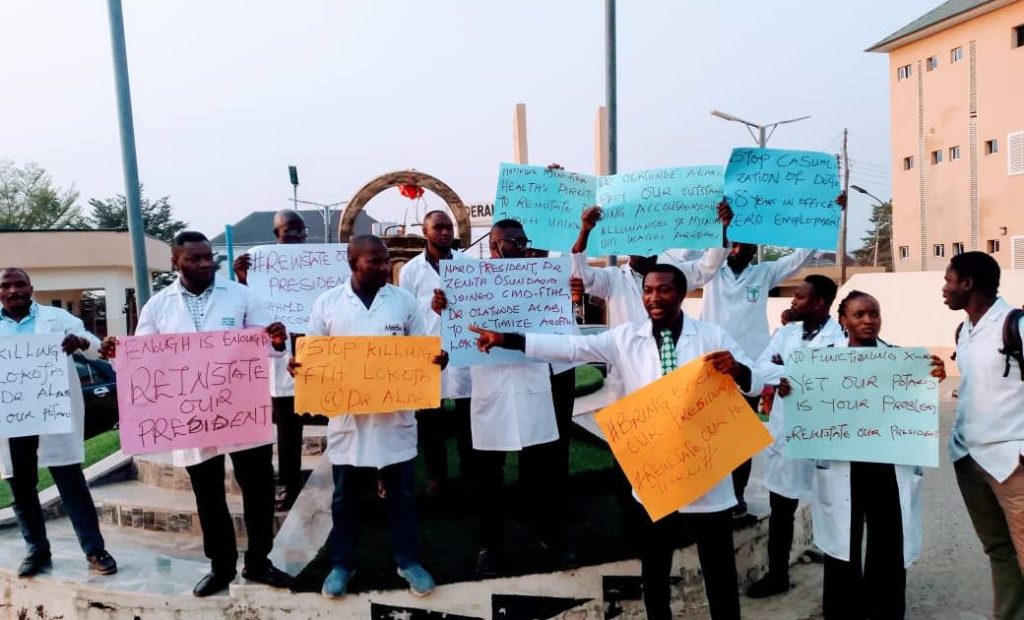The Federal Teaching Hospital Lokoja, a critical healthcare institution in Nigeria’s Kogi State, is embroiled in a deepening crisis, marked by deteriorating infrastructure, dwindling medical staff, and alleged mismanagement. Resident doctors, through their association, have repeatedly voiced their concerns, staging protests to draw attention to the dire situation. They allege that the hospital is on the brink of collapse, citing a drastic reduction in medical personnel, from 315 doctors to a mere 43, due to poor working conditions, exploitative contract terms, and lack of essential resources. This severe shortage of manpower has crippled various units and sections, impacting the hospital’s capacity to deliver effective healthcare services.
The core issues driving the doctors’ protests include the precarious employment status of many doctors who are forced into short-term contracts, renewed every two months. These contracts deprive them of crucial benefits such as pension contributions, promotions, hazard allowances, and even the nationally mandated minimum wage. Coupled with the dilapidated state of the hospital’s facilities and equipment, these exploitative employment practices have created a demoralizing and unsustainable work environment, leading to an exodus of qualified medical professionals. The doctors highlight the irony of this situation, given the significant government expenditure on the health sector, which seemingly fails to reach frontline healthcare workers.
The resident doctors’ grievances extend beyond poor working conditions and contractual issues. They accuse the hospital management, specifically the Chief Medical Director, Dr. Olatunde Alabi, of perpetuating a “slave camp” environment, characterized by disregard for staff welfare and a blatant refusal to address critical operational deficiencies. The doctors allege that the CMD has ignored directives from the Ministry of Health to utilize internally generated revenue to clear outstanding arrears owed to hospital staff. This financial mismanagement, coupled with a long-standing failure to recruit new doctors and other healthcare workers since 2012, has exacerbated the hospital’s operational challenges. The doctors claim that at least 14 petitions detailing these issues have been sent to various authorities, including the Minister of Health, the Secretary to the Government of the Federation, the Head of Service of the Federation, the Permanent Secretary of the Federal Ministry of Health, and the Nigerian Medical Association, yet no concrete action has been taken.
The case of Dr. Jimoh Umar, the suspended president of the Association of Resident Doctors, further underscores the alleged high-handedness of the hospital management. Dr. Umar was suspended for advocating for improvements in the hospital, a move the resident doctors view as victimization. Despite a directive from the Minister of Health, relayed through the Permanent Secretary, for Dr. Umar’s reinstatement, the CMD has allegedly refused to comply, further escalating tensions. The doctors argue that the CMD’s refusal to implement the ministerial directive constitutes insubordination and a violation of public service rules, demonstrating a disregard for established procedures and higher authorities.
The deteriorating conditions at the Federal Teaching Hospital Lokoja paint a grim picture of healthcare access in the region. The shortage of doctors, coupled with dysfunctional equipment and inadequate infrastructure, has dire consequences for patients. The doctors recounted instances where patients died due to the lack of basic amenities like electricity and functional equipment. These incidents underscore the urgency of the situation and the potential for preventable deaths if the hospital’s operational challenges are not addressed promptly. The resident doctors’ protests serve as a desperate plea for intervention before the hospital collapses entirely.
The doctors’ call for an investigation into the alleged “wickedness, decay of facilities, and inhuman treatment” at the hospital is a direct appeal to President Bola Tinubu and the Minister of Health, Ali Pate. They urge the highest authorities to hold the hospital management accountable for its alleged mismanagement and create an enabling environment for healthcare professionals to deliver quality care. The future of the Federal Teaching Hospital Lokoja, and the well-being of the community it serves, depend on swift and decisive action to address these critical issues. The resident doctors’ continued advocacy, despite alleged intimidation and victimization, highlights their commitment to patient care and the urgent need for systemic change within the hospital.














